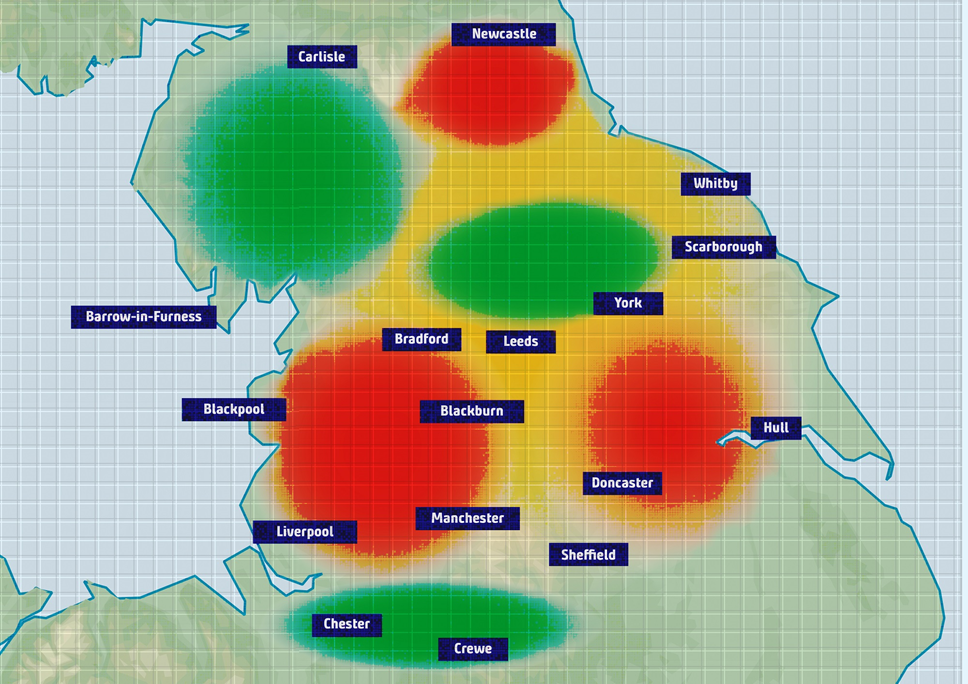
Heatmap reveals which counties across the North of England have the most students commuting by rail ahead of ‘back to school’ next week
Northern has released details of the most popular routes on its network for student commuters.
Cheshire, Cumbria, Greater Manchester, Lancashire & West Yorkshire are riding high with large numbers of stations being used by students for their commute to school (highlighted in green on the map), while Merseyside, Tyne & Wear, South and East Yorkshire have far fewer (shown on the map in red).
(A detailed route map showing individual stations is available in PDF format at the bottom of this email.)
Derbyshire and North Yorkshire have individual pockets of high student usage, but the trend isn’t widespread in those counties.
The train operator has released the data as part of its campaign to encourage more students to switch from road to rail by investing in an U16 Education Season Ticket before the new school term starts next week.
The scheme, which Northern runs in partnership with 166 secondary schools and university technical colleges across the North of England, offers students 75%-off the cost of their commute.
For more information and details of how to apply for a ticket, parents should visit: www.northernrailway.co.uk/tickets/educational-season.
Mark Powles, commercial and customer director at Northern, said: “It’s interesting to see just how much a difference there is between the counties of students that use the train to get to school.
“We want to encourage as many as possible to make the switch from road to rail – and with 75%-off the cost of their commute, U16 Education Season Tickets offer one of the most generous discounts of any ticket scheme in the country.”
The most popular stations for student commuters are:
|
County |
No: of popular stations |
Stations / locations |
|
Cumbria |
38 |
Arnside, Grange Over Sands, Kents Bank, Cark & Cartmel, Ulveston, Dalton, Roose, Barrow-in-Furness, Askam, Kirky-in-Furness, Foxfield, Green Road, Millom, Silecroft, Bootle, Ravenglass, Drigg, Seascale, Sellafield, Braystones, Nethertown, St. Bees, Corkickle, Whitehaven, Parton, Harrington, Workington, Flimby, Maryport, Aspatria, Wigton, Dalston, Carlisle, Windermere, Staveley, Burneside, Kendal and Oxenholme Lake District. |
|
Lancashire |
23 |
Southport, Meols Cop, Bescar Lane, New Lane, Burscough Bridge, Hoscar, Parbold, Appley Bridge, Gathurst, Wennington, Silverdale, Carnforth, Morecambe, Heysham Harbour, Bare Lane, Lancaster, Clitheroe, Walley, Langho, Ramsgreave & Wilpshire, Blackburn, Darwen and Entwistle. |
|
Greater Manchester |
23 |
Broadbottom, Hattersley, Godley, Newton For Hyde, Flowery Field, Guide Bridge, Bromley Cross, Hall i’ th’ Wood’, Bolton, Westhoughton, Wigan, Newton-le-Willows, Patricroft, Eccles, Manchester Oxford Road, Manchester Piccadilly, Levenshulme, Heaton Chapel, Stockport, Cheadle Hulme, Navigation Road, Altrincham and Hale. |
|
West Yorkshire |
20 |
Steeton & Silsden, Keighley, Crossflatts, Bingley, Saltaire, Shipley, Frizinghall, Bradford Forster Square, Baildon, Guiseley, Menston, Burley-in-Wharfedale, Ben Rhydding, Ilkley, Apperley Bridge, Kirkstall Forge, Leeds, Burley Park, Headingley and Horsforth. |
|
Cheshire |
20 |
Chester, Mouldsworth, Delamere, Cuddington, Greenbank, Northwich, Lostock Gralam, Plumbley, Knutsford, Mobberley, Ashley, Crewe, Sandbach, Holmes Chapel, Goostrey, Chelford, Alderley Edge, Wilmslow, Styal and Handforth. |
The most popular stations within North Yorkshire and Derbyshire are:
|
North Yorkshire |
12 |
Skipton, Cononley, Weeton, Pannal, Hornbeam Park, Harrogate, Starbeck, Knaresborough, Cattal, Hammerton, Poppleton and York. |
|
Derbyshire |
9 |
Glossop, Hadfield, Dinting, New Mills, Furness Vale, Whaley Bridge, Chapel-en-le-Frith, Dove Holes and Buxton. |
Northern is the second largest train operator in the UK, with 2,500 services a day to more than 500 stations across the North of England.
Contact Information
Northern Trains Press Office
Notes to editors
A network route map showing the popular student commuter routes is attached below. Routes popular for student commutes are shown in green. Those with low student usage are shown in red.
